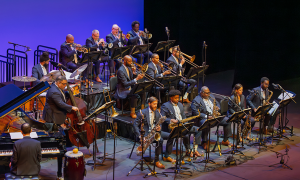Home » Jazz Articles » Live Review » Joshua Redman Group At Gates Concert Hall
Joshua Redman Group At Gates Concert Hall

Courtesy Steven Roby
Gates Concert Hall
Denver, Colorado
March 1, 2024
A luminary of contemporary jazz, Joshua Redman graced Gates Concert Hall last Friday with his stellar group featuring Paul Cornish (piano), Philip Norris (bass), Nazir Ebo (drums), and the outstanding vocalist Gabrielle Cavassa.
The 100-minute sold-out performance relied heavily on songs from Redman's 2023 Blue Note Records debut where are we. Yes, it's all lowercase and without a question mark—all intentional.
"I think there's a certain ambiguity in the title because the title should be a question, but I intentionally left the question mark off," noted Redman in our pre-show interview. "There is an ambiguity in the entire concept of the album. It's an album of songs about places in the United States, which is not a revolutionary concept. It's been done before and probably far better than I did."
The show opened with a clever mash-up. Count Basie's "Goin' to Chicago" was done as a slower, regretful tune, not the more common angry blues tune, and paired with Sufjan Stevens' "Chicago." Cavassa's sultry voice perfectly matched Redman's tenor sax and gave way to an evening of unparalleled musicality and synergy.
One of the standout moments of the concert was yet another mash-up of "Stars Fell on Alabama" and John Coltrane's profoundly moving "Alabama."
"John Coltrane's 'Alabama' was his meditation on the bombing of the 16th Baptist Church in 1963, which was a horrific, racist, terrorist act, but it was one that really galvanized and captivated the nation and a source of organizing. It was an impetus for a lot of action in the civil rights era," explained Redman. "I wanted to juxtapose that with a very different one, the old, classic, American Songbook standard. American reality, but through the lens of the same state, Alabama."
Redman channeled his inner Coltrane for 15 minutes using dark, edgy chords, while Cornish's piano solo was captivating, displaying technical brilliance and deep emotional resonance. Finally, Redman brought it in for a gentle landing with help from Ebo's mallets on the cymbals.
Another evening highlight was the performance of "By the Time I Get to Phoenix," a song made famous by Glen Campbell and later by Isaac Hayes. The piece began with a hauntingly beautiful melody, with Cavassa adding her brilliant touch to the lyrics.
My only criticism of the show was the need for a more creative production. Redman and Cavassa were tightly wedged between the piano and drums, with the bassist behind them and monitors in front boxing them in. Gates Hall has a large stage with ample space for the performers to move about, but as was the case with Friday's show, the band configuration would have been better suited for a small jazz club's stage. The lighting was dim and a constant blend of orange and purple. Behind them was a giant empty screen begging for a back-projection of B-roll footage and archival photos representing the various areas of America the songs covered.
The only time Redman broke the travelogue theme was for the encore with Barry Manilow's earworm from the 1970s, "Could It Be Magic."
After the show, several musicians came out to sign CDs and chat with the grateful audience.
Setlist
Chicago Blues/Chicago; Streets of Philadelphia; Hotel California; By the Time I Get to Phoenix; That's New England; Rhode Island is Famous for You. Encore: Could It Be Magic.Tags
Live Review
Joshua Redman
Steven Roby
United States
Colorado
Denver
Paul Cornish
Philip Norris
Nazir Ebo
Gabrielle Cavassa
Isaac Hayes
PREVIOUS / NEXT
Joshua Redman Concerts
Support All About Jazz
 All About Jazz has been a pillar of jazz since 1995, championing it as an art form and, more importantly, supporting the musicians who make it. Our enduring commitment has made "AAJ" one of the most culturally important websites of its kind, read by hundreds of thousands of fans, musicians and industry figures every month.
All About Jazz has been a pillar of jazz since 1995, championing it as an art form and, more importantly, supporting the musicians who make it. Our enduring commitment has made "AAJ" one of the most culturally important websites of its kind, read by hundreds of thousands of fans, musicians and industry figures every month.

























